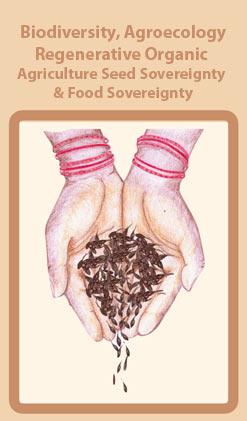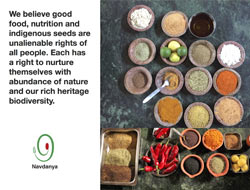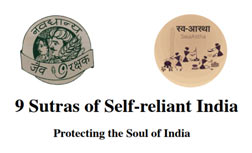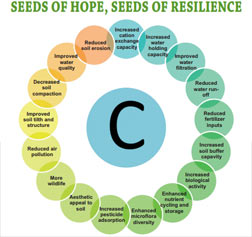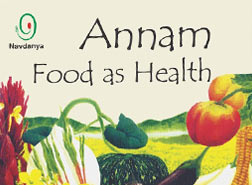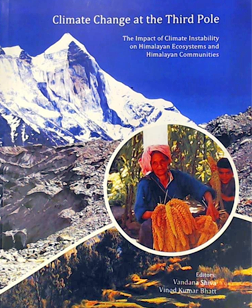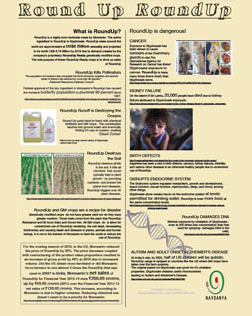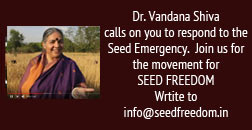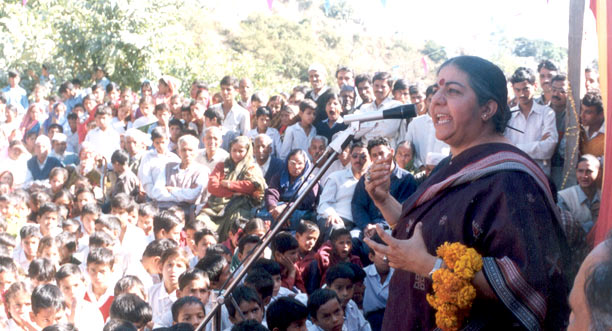 The new IPR laws embodied in the TRIPs agreement of WTO have unleashed an epidemic of the piracy of nature’s creativity and millennia of indigenous innovation. RFSTE/ Navdanya started the campaign against biopiracy with the Neem Campaign in 1994 and mobilized 1,00,000 signatures against neem patents and filed a legal opposition against the USDA and WR Grace patent on the fungicidal properties of neem (no. 436257 B1) in the European Patent Office (EPO) at Munich, Germany.
The new IPR laws embodied in the TRIPs agreement of WTO have unleashed an epidemic of the piracy of nature’s creativity and millennia of indigenous innovation. RFSTE/ Navdanya started the campaign against biopiracy with the Neem Campaign in 1994 and mobilized 1,00,000 signatures against neem patents and filed a legal opposition against the USDA and WR Grace patent on the fungicidal properties of neem (no. 436257 B1) in the European Patent Office (EPO) at Munich, Germany.
Along with RFSTE, the International Federation of Organic Agriculture Movements (IFOAM) of Germany and Ms. Magda Alvoet, former Green Member of the European Parliament were party to the challenge. The patent on Neem was revoked in May 2000 and it was reconfirmed on 8th March 2005 when the EPO revoked in entirety the controversial patent, and adjudged that there was “no inventive step” involved in the fungicide patent, thus confirming the ‘prior art’ of the use of Neem.
In 1998, Navdanya started a campaign against Basmati biopiracy (Patent No. 5663484) of a US company RiceTec. On Aug 14th 2001 Navdanya achieved another victory against biopiracy and patent on life when the United States Patent and Trademark Office (USPTO) revoked a large section of the patent on Indian Basmati rice by the US corporations RiceTec Inc. These included
- The generic title of the RiceTec patent No. 5663484, which earlier referred to Basmati rice lines;
- The sweeping and false claims of RiceTec having ‘invented’, traits of rice seeds and plants including plant height, grain length, aroma which are characteristics found in our traditional Basmati varieties and
- Claims to general methods of breeding which was also piracy of traditional breeding done by farmers and our scientists (of the 20 original claims only three narrow ones survived).
The next major victory against biopiracy for Navdanya came in October 2004 when the European Patent Office in Munich revoked Monsanto’s patent on the Indian variety of wheat “Nap Hal”. This was the third consecutive victory on the IPR front after Neem and Basmati, making it the third consecutive victory. This was made possible under the Campaign against Patent on Life as well as against Biopiracy respectively. MONSANTO, the biggest seed corporation, was assigned a patent (EP 0445929 B1) on wheat on 21 May 2003 by the European Patent Office in Munich under the simple title “plants”. On January 27th 2004 Research Foundation for Science Technology and Ecology (RFSTE) along with Greenpeace and Bharat Krishak Samaj BKS) filed a petition at the European Patent Office (EPO), Munich, challenging the patent ights given to Monsanto on Indian Landrace of wheat, Nap Hal. The patent was revoked in October 2004 and it once again established the fact that the patents on biodiversity, indigenous knowledge and resources are based on biopiracy and there is an urgent need to ban all patents on life and living organisms including biodiversity, genes and cell lines.
Through the citizens’ actions, we have won three biopiracy battles and have thus contributed to the defense of farmers’ rights, indigenous knowledge and biodiversity. Navdanya’s focus on collective, cumulative innovation embodies in indigenous knowledge has created a worldwide movement for the defense of the intellectual rights of communities.
Now the corporations are pirating the collective innovation of farmers in breeding crops that are resilient to droughts, floods and salinity. The biotechnology industry is spreading the misconception that without genetic engineering we will not be able to evolve crops with climate resilience. As a recent Monsanto advertisement states :
9 billion people to feed. A changing climate. Now What?
That is why we have started the campaign against bio piracy of climate resilient crops.
And of course offers its GM seeds as the answer.


